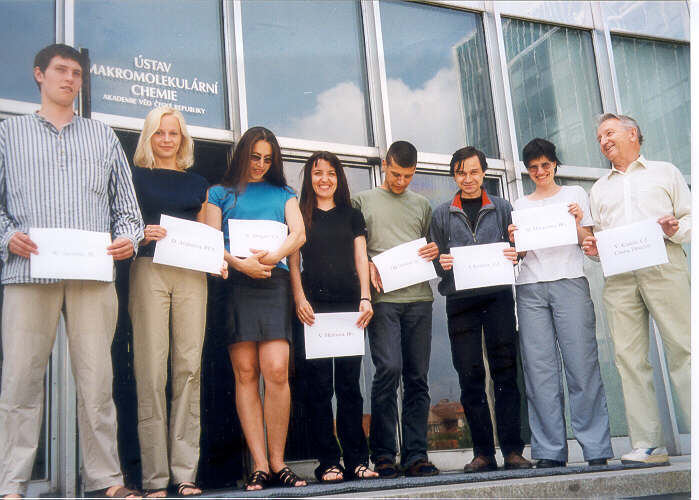|
News
& Notices
Organizations & People
Standing
Committees
Divisions
..I
..II
..III
..IV
..V
..VI
..VII
..VIII
..Shortcut
Access
Projects
Reports
Publications
Symposia
AMP
Links
of Interest
Search
the Site
Home
Page
|
|
UNESCO/IUPAC
Postgraduate Course
in Polymer Science
The Institute of Macromolecular Chemistry of the Academy of Sciences
of the Czech Republic in Prague, with its staff of 260 including
130 scientists, is one of the major centers of academic research
in polymer science. From the early seventies to the late eighties,
the Institute organized jointly with the Charles University postgraduate
training in polymer science for young scientists from emerging countries.
After a pause of several years, in 1996, the Institute launched,
under joint sponsorship of UNESCO and IUPAC, the new project of
Postgraduate Courses in Polymer Science. So far, four runs were
completed. The fifth run is going to start in October 2000.

A group of
participants of the 4th UNESCO/IUPAC Postgraduate Course in Polymer
Science 1999-2000. From right to left: Dr. Vlastimil Kudela, Director
of the Course, Milena Mihaylova - Bulgaria, Igor Koshets - Ukraine,
Gueorgui Guinov - Bulgaria, Vessela Malinova - Bulgaria, Kateryna
Dragan - Ukraina, Daria Andreeva - Russia, Wojciech Jasinski -
Poland.
The Course lasts 10 months. One of its components is 50 hours of
lectures in modern polymer science. To give a few examples of topics
of lectures: advanced polymerization techniques; thermodynamics
and solution properties of polymers; spectroscopy of polymers; polymers
in medicine. Several lectures are also devoted to basics of chemical
English and principles of macromolecular nomenclature according
to IUPAC recommendations.
Most of the participants have decent background in principles of
polymer science but only limited experience in experimental work
with up-to-date equipment because of the difficult situation in
their home countries. Therefore, the focus of their involvement
is work on a research project under the supervision of a senior
scientist. The participants can exploit all experimental facilities
of the Institute. They are also invited to take part in all educational
activities at the Institute, such as seminars, lectures of visiting
scientists, conferences organized by the Institute, etc. It has
turned out that this is an efficient scheme. On the average, one
paper in an international scientific journal and one communication
at an international conference per participant result, which indicates
that some new skills have been acquired.
The number of participants in a run of the Course varies between
five and thirteen, depending on the available funds. So far, most
of the participants were from Eastern Europe and parts of the former
Soviet Union. Recently, young university graduates from South Africa
have applied for admission to the Course. The participants enjoy
free accommodation, free health care, and a tax- free stipend corresponding
approximately to the average net per capita income in the country.
The travel expenses cannot be covered. If IUPAC supports a run of
the Course financially, the sum is used to pay the stipend to one
or two participants, the IUPAC stipendiaries.
A certificate of graduation is issued to the participants. Follow-up
has shown that graduation of the Course may be very helpful to professional
promotion of the graduates in their home countries.
Pavel
Kratochv�l
IUPAC Macromolecular Division
Page last modified 28 December 2000.
Copyright ©1997-2000 International Union of Pure and Applied Chemistry.
Questions or comments about IUPAC, please contact, the Secretariat.
Questions regarding the website, please contact web
manager.
|

